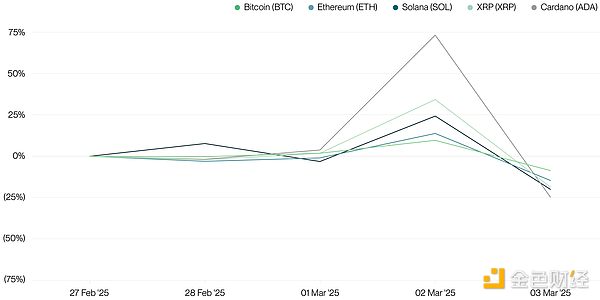Author: Matt Hougan, Chief Investment Officer of Bitwise; 0xjs@Jinse Finance
Something strange happened in the past few days.
On Sunday, President Trump announced that the United States will create a strategic cryptocurrency reserve, holding five crypto assets: Bit, Ethereum, Solana, XRP, and ADA.
After the news broke, the market initially surged significantly, with Bit price immediately jumping from $85,000 to $95,000. But as Sunday passed, by Monday the market started to retreat. At the time of writing this memo, Bit as well as the other assets mentioned in the announcement not only gave back all their gains, but even fell further.
Crypto assets first rose and then fell after the reserve announcement

Data source: Bitwise Asset Management, data from CoinGecko. Data range from February 27 to March 3, 2025.
You may ask: Why is this the case? Isn't this good news?
The short answer is "yes, it is good news", and I will explain in detail in a moment. But this is not what the market is reflecting. Instead, market participants have a negative attitude towards this announcement because the proposed reserve includes not only Bit, but also speculative assets like ADA.
Several prominent figures in the crypto community have questioned this reserve and the inclusion of non-Bit assets. (See the tweets of Coinbase CEO Brian Armstrong and Castle Island founder Nic Carter.) At Bitwise, we also believe the optimal form of the reserve should only include Bit, as our CEO Hunter Horsley wrote on Sunday.
Although the rollout of this initiative has flaws, I believe the market has misinterpreted it. Fundamentally, this is good news, and I think the market will eventually recognize this.
Here are three points that I believe the market has overlooked:
Point One: The Initial Proposal Is Not the Final Solution
So far, what we know is that Trump's initial proposal is unlikely to be the final solution. The tariff issue was like this, and it is likely the case here as well.
In the coming days, crypto industry leaders will express their views on this reserve plan. For example, on Friday, White House crypto czar David Sacks will host a crypto summit at the White House with industry leaders, and I guess the proposed reserve will be a key topic.
It's possible that the opposition to this announcement is strong enough to cancel the entire reserve plan, or it may be limited to the assets the U.S. government previously held through seizures. But I doubt this.
In fact, I think the boldness of the initial proposal has already expanded the "Overton window" (the range of policies that the public is willing to accept at a given time) for the reserve. Before Sunday, the idea of establishing a strategic crypto reserve seemed quite unlikely to materialize. Now, a reserve consisting solely of Bit sounds almost conservative.
When the dust settles, I expect the final reserve to be almost entirely composed of Bit, and the scale will be larger than people imagine.
Point Two: Other Countries Are More Likely to Follow and Buy
While the market is concerned about the domestic political backlash against the five-asset proposal, it's important to remember that the most important audience for this news is not domestic, but international.
Some Bit supporters are excited about the idea of the U.S. establishing a strategic Bit reserve because they expect it to trigger a global race. Countries will prepare for Bit to become a globally important monetary asset.
Assuming the U.S. reserve plan is implemented in some form, it's hard to imagine other countries not following suit. This is already an emerging trend: El Salvador, Bhutan, and Abu Dhabi have all publicly purchased Bit, and there are rumors that other countries are also buying.
If you're Honduras, Mexico, or Guatemala, and you see El Salvador and now the U.S. buying Bit, can you really afford to hold zero? If you're Dubai, Qatar, or Saudi Arabia, and you see Abu Dhabi and the U.S. taking the lead, can you be at ease? How will Russia and China react?
Last week's announcement - though not perfect - marks the first time the U.S. has recognized Bit as a strategic asset. As long as this remains the case, in my view, this is a game-changing event.
Point Three: Crypto Assets Bought Are Unlikely to Be Sold
Some observers are concerned that the strategic crypto reserve established during President Trump's term will experience buying and selling cycles with the change of administrations. When Trump leaves office in four years, will the Democratic leadership sell the crypto assets held by the U.S.?
In my view, this is unlikely to happen. In the U.S., the enthusiasm for crypto is uneven: there are quite a few people who love crypto, while those who hate it are relatively few. We learned from the last election that the Republican support for crypto won them many votes, while the Democratic hostility to crypto brought them little benefit. I suspect any crypto purchased will be held long-term, just like the U.S. gold reserve. Democratic leaders won't want to alienate voters for little benefit to themselves.
Conclusion
It's frustrating that crypto can rarely achieve a pure victory these days. If Sunday's announcement was "just" about establishing a strategic Bit reserve, I think the market would be higher. The inclusion of smaller-cap assets like ADA unnecessarily complicates things. The biggest risk may be that the market is so averse to this proposal that even a simplified Bit-only reserve plan gets canceled.
But I don't think this is likely to happen. So far, the Trump administration seems to be sticking to its policy goals, and I expect some version of this proposal to eventually move forward. And while the rollout and specific details are not perfect, I suspect the final version will be quite good.
Ultimately, I believe the market's initial reaction was correct: the U.S. government's designation of crypto assets as "strategic assets" is positive news. I think the market will eventually recognize this.








